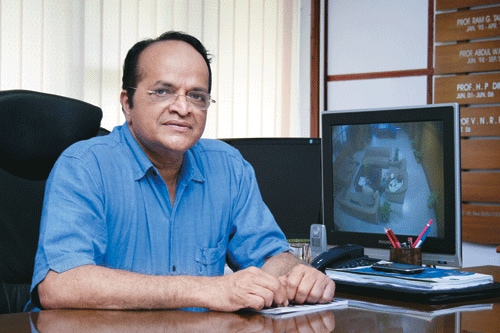Prof. V.N. Rajasekharan Pillai, Chairman DEC, VC - IGNOU
Prof. V.N. Rajasekharan Pillai is a man in a hurry. Donning two big hats: one as Chairman of DEC, the regulator of distance education in the country and the other as VC of IGNOU, the largest open university in the country, he is focused on creating more alliances and enrolments. His mandate is to move our pitiable Gross Enrolment Ratio (GER) higher, a tall order with a population of India’s proportions. In this frenzied expansion, is quality taking a back seat?

Q. IGNOU is in an expansion mode. Where is it heading to?
A. We are focused on three key thrust areas, right now. One is to definitely enhance the Gross Enrolment Ratio. Our approach is optimal utilisation of existing facilities. We see there is a lot of infrastructure and intellectual capital available outside the formal confines of the departments of education or Ministry of HRD or the universities.
How these infrastructures can be contextualised and availed of, that is one thing. Two, there are also many trained, experienced and skilled people available outside the university system. How can we network with them and make use of their capabilities for providing education?
Q. At such a scorching growth pace, doesn’t quality suffer?
A. As you know, we have an Open University system through distance learning mode. We currently have 2.8 million students. But we are not managing them only with the resources in this campus. We have 61 regional offices. There we have our own people, our own set-up including academic-level people. Overall, we have 900 academic level positions in these regional offices across the country. But we have faculty spread over 3,000 study centres across the country. There we have 50,000 teachers.
Q. 50,000 full-time teachers?
A. No, part-time. IGNOU is not just a unitary university but it extends across various institutions. We have collaborations with 3,000 institutions in both the private and the public sector. It may be in the army, in the navy, in an engineering college, in a university or in a higher secondary school. Teachers from these institutes work part-time for us as examiners, as counsellors, as paper-setters, and course writers. Basically, their extra time is being made use of. Another area is quality of content. Only if the quality of the teaching and learning process is improved, will the student come to the class; otherwise he won’t. So, improving the quality automatically increases the reach, the quantity.
Q. What about the quality of course material?
A. Our material is of high-class quality. It is the contribution of over 70,000 teachers over the last 25 years. So every day I can confidently say there are 20-25 expert level committee meetings happening across the country spearheaded by IGNOU. So we make use of these resources, make the material, edit and print it. We have the largest repository of educational material in the whole world.
Q. How frequently is course material updated?
A.Every five years, that is the mandate. Very eminent people are involved in this. 250 man-days are involved in the preparation of the material of a particular course/subject of a particular programme. So this material is the result of the teamwork of a large number of people from the universities and colleges of the conventional education system. If they can prepare this world-class self-study material, why shouldn’t they also teach a large number of people, using this material? So, we are looking at how to make use of this distance learning technology and information and communication technology to enhance the quality of the teaching process. So, our approach is subject-based, to improve the quality through ICT pedagogy. For example, how can a Chemistry teacher use ICT to demonstrate virtual experiments or -273 degree centigrade temperature, which can never be done in a real lab? Even in Sociology, Biology or Organisational Behaviour many things can be better explained by using ICT-enabled models.
Q. You have been mentioning technology quite a lot. Can you tell us what technological tools are being used?
A. We are using the VSAT technology called EduSAT to reach people, and we use Gyandarshan on TV. Then we have Gyan Vani, the community radio. We have put all our material in soft copy on the Internet, FlexiLearn is the platform we are using. In Flexi-Learn, we have put all our material and tens of thousands of videos on the platform as an Open Education Resource (OER); several thousands of audio cassettes, all this is in our repository and has now been put on this platform called Flexi-learn. You can access it for free but if you want to appear for an examination you have to pay Rs. 100 or 200 per paper to get a certificate/ degree/ diploma.
Q. There is a criticism that IGNOU is moving too fast. Your comments.
A. No. Only 5% of the workforce in the country has some sort of a certification but they are working. And this is in contrast to over 80-90%, in developed countries such as the US. We have a real challenge - to train a large number of teachers. We need millions of teachers. And then, the so-called trained teachers, what is their training? Take this example of RTE: a shortage of 5 lakh teachers for just one project, which is limited to just primary education. Then they have to be given secondary education as well. Where are the teachers? Who will train these teachers? We need teacher-educators. We need to move faster.
There are 230,000 public education and training institutes in the country outside the formal education sector, under different ministries. If the facilities and the capabilities (of people working there) are utilised for just 10 more hours per week, we can double our capabilities without adding a single brick in this country. So the optimal utilisation of the facilities by networking with the institutions is precisely the way we are working.
Articles
Upcoming Exams
Application Date:05 September,2024 - 25 November,2024
